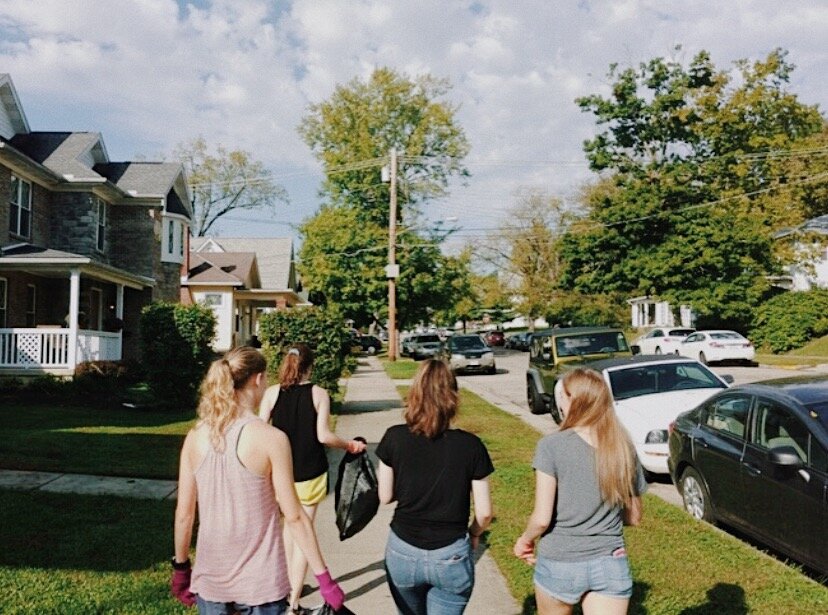How to Live Sustainably and Low-Waste at College
Photo: Members of Zero-Waste Oxford (Miami University student group) picking up trash near campus
By: Lauren Kleve, Intern
When attending college, it can sometimes seem impossible to maintain sustainable habits. The purpose of this blog post is to serve as a guide to help you achieve sustainability when living at college! Throughout your college experience there will be a lot of things that are out of your control, so you want to be as environmentally friendly as possible in the areas where you do have control. I will cover how to be sustainable in several different parts of the college experience including: shopping for college, eating, living on and off campus, classes and schoolwork, .
Shopping for college
Let’s start out with the first thing you do to prepare for college life: shopping. Whether it’s your first year and you will be living in a dorm or it’s your senior year and you will be living in a house or an apartment, you will need to obtain quite a few things for your college living space. If you are in a dorm, you’re probably going to shop for bedding, storage supplies, decorations, etc. I made the mistake my freshman year of buying all new things and most of them were plastic! Don’t follow in my footsteps! Everyone thinks you will need so many new things for your dorm, but you don’t! Only buy what is necessary and you know for a fact you will need and regularly use. In later years of college when moving into a house or an apartment at college, you will have a better idea of the things you will need. However, then you have to worry about shopping for furniture and appliances like a microwave and vacuum cleaner! Here are some things you can do to stay eco-friendly when shopping for college:
Make a list of only the things you NEED
Take as many things as possible that you or your family already have!
Buy second hand whenever possible or ask friends who already attended college for potential leftover storage bins and furniture
Check craigslist, facebook marketplace, offerup, letgo, thrift stores, garage sales, etc. for college furniture, decorations, kitchen supplies and whatever else you might need!
Make your own decorations! There is no need to spend money on new things you will probably only use for a year, so make your own! You can get picture frames or mugs from thrift stores and decorate them or find things around your house.
If buying something new, choose sustainable materials like stainless steel, wood, or bamboo! Avoid plastic as much as possible!
Buy a backpack that is good quality and will last throughout your college years and longer! Patagonia makes high quality gear from sustainable materials, and they even have the Pataoniga Worn Wear online shop - a second-hand shop on their website where you can purchase their refurbished, long-lasting goods for less!
Shop in person to avoid unnecessary packaging from shipping and bring your own reusable bags to the stores!
Eating
Eating sustainably at college can be very hard, but there are some things you can do to contribute to less waste and reduce your ecological footprint!
Eat at dining halls or make your own food! At the dining hall, don't overstuff your plate leaving a lot of wasted food at the end of your meal. Only take what you’ll eat!
Take only one napkin at dining halls or make your own from old pieces of cloth!
Avoid buying packaged meals, snacks, or eating at places where the food comes in containers
Eat a more plant based diet! You don’t have to commit fully, but any time you avoid consuming animal based foods, you are helping the planet!
When you no longer live in dorms and are buying your own groceries, shop local and go to your local farmer’s markets!
Buy unpackaged foods and buy in bulk when possible.
When eating out, bring your own tupperware for a to-go container
Living on and off campus
No matter where you are living at college, you can choose to practice as many sustainable habits as possible. Reduce your waste as much as possible by refusing what isn’t necessary and using reusable alternatives! (See our previous blog post, “A Guide to Living Zero-Waste,” for lists of reusable alternatives). Recycle whatever you can, but make sure to research your community’s recycling program where your college is located to see what is recyclable there because each community’s recycling is different. If you are able to, compost! I am very lucky that the city my university is located in has a composting program so do some research to see if your university’s city does or if there is another way to compost near you. Also, if you live in a house, you can start your own compost in your backyard! Want to learn how to compost? Head to Debris Free Oceans’ workshop on composting! Here is a laid out list for you to try to follow:
Refuse handouts, freebies, and whatever else isn’t necessary
Recycle properly
Compost, if possible
Reduce energy usage by turning off lights, using LED light bulbs, unplugging electronics, etc.
Reduce water usage by turning off water when washing hands, brushing teeth, washing dishes, etc.
Classes and schoolwork
There are many ways to avoid waste in the academic part of your college experience, however, some of it is out of your hands and is up to your professors. Some ways students can be eco-friendly for their classes are to:
Take notes on your laptop (if your professor allows) instead of using notebooks
If your professor makes you take notes by hand, buy notebooks made from recycled materials
Choose ebooks over paper textbooks
Don’t buy so many school supplies, buy only what is necessary and choose sustainable materials and products
For example, I only have two pencils. They are stainless steel mechanical pencils that will last me forever, simply requiring lead refills
Don’t use flashcards! Instead, you can download a flashcard app on your phone
Ask your professor to go paperless!
I asked one of my professors to stop handing out print outs and email them or post them online, and he did!
Going out and parties
At some point, probably every college student will have a drink or go to a college party, and even then there are ways students can be sustainable! If you are the person hosting a party, make sure you have a recycling can easily accessible, and only buy drinks in containers that can be recycled (aluminum is the most recyclable material). Also, if you are using solo cups, save them to be washed and reused - they can even go in the dishwasher! If you are the one going to a party, it can be harder to stay eco-minded, but there are some things you can do! If you plan to go to a house party and go directly back to your house after, bring your own cup for drinks instead of using disposable solo cups - not only are you eliminating waste, but you won’t mix your drink up with any of the others at the party! Or if the person’s house you are going to is a friend, you can bring your own cup and leave it there to get next time you see them! Whether you’re at a party or at a bar, just make sure to properly dispose of your cans and bottles! If you want to go the extra mile, in the mornings after parties, walk around outside your college town and pick up some trash! The quick tips:
Recycle everything you can (but know what you can and cannot recycle!)
Reuse solo cups - you can even throw them in the dishwasher!
Refuse straws at bars
Only buy bottles and cans that can be recycled
Glass bottles and aluminum cans are better than plastic bottles
Bring your own reusable cup to parties!
Go on trash pick ups around your area the morning after parties!
Living sustainably at college can seem unachievable, but now you know it’s not! Try your best to use reusables, dispose of waste properly, buy sustainable products and materials, eat sustainably, and remember it’s okay to not be perfectly sustainable! Do your best, and most importantly enjoy your time at college!




